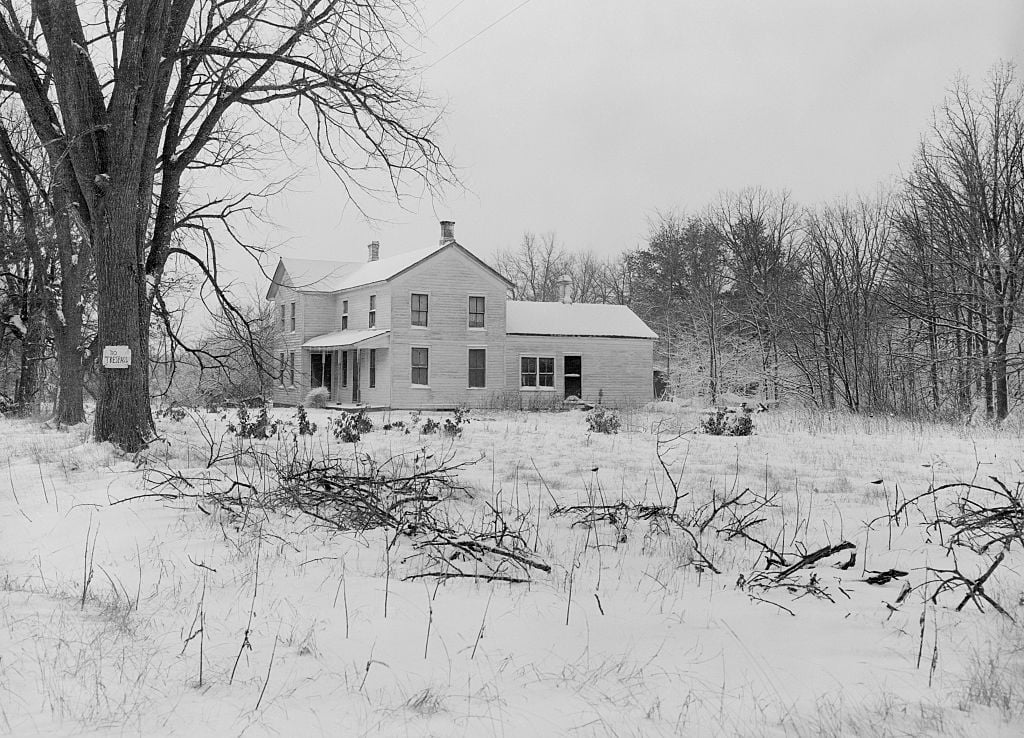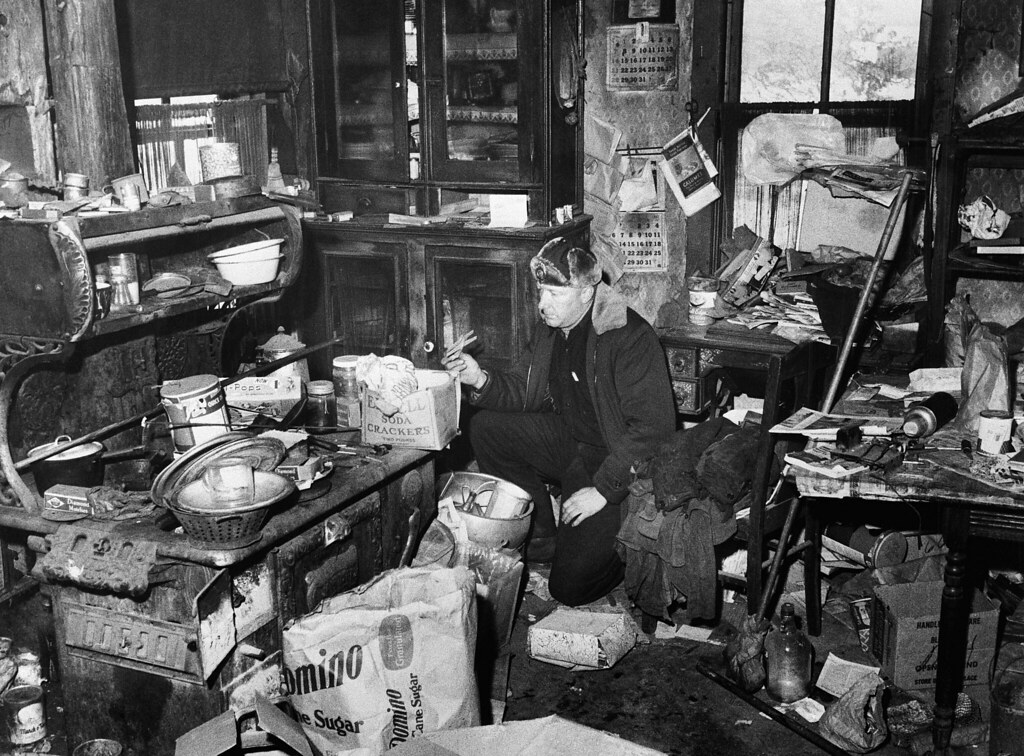The Horror Story of Ed Gein’s House and Ed Gein, aka “Leatherface”
America’s obsession with serial killers has been thriving for decades. While Jack the Ripper and Ted Bundy are some of the most infamous murders, none are as disgusting as Ed Gein.
Ed Gein, who would become the inspiration behind Tobe Hooper’s Leatherface killers in “The Texas Chain Saw Massacre,” was an American murderer, suspected serial killer, and body snatcher. But it is what he did with the bodies that left a mark on Americans. Let’s get into it.
Ed Gein, Butcher of Plainfield
Born in La Crosse, Wisconsin, on Aug. 27, 1906, Edward Theodore Gein was the second son of George Philip Gien and Augusta Wilhelmina Gein. Gein’s mother was described in various reports as controlling, puritanical, oppressive, and fervently religious.

Source: MrCreepyPasta/YouTube
She believed that all women, excluding herself, were “instruments of the devil,” and that sex and lust were immoral and to be avoided, according to Crime and Investigation. Despite this abuse, Ed idolized his mother and became obsessed with her.
Ed Gein’s Isolation and Abuse from His Mother
This level of obsession Gein had for his mother could have come from his extreme isolation. The family lived on 155 acres of farmland in Plainfield, Wisconsin. Gein only left the farm to attend school. “The Firebirds Among the Psychopaths” explains that Augusta would “severely punish” her sons if they tried to make friends.

Source: Find A Grave
Augusta’s determination to keep the outside evil of the world away from her family altered Gein’s psyche.
Where Is Plainfield, Wisconsin?
Ed Gein’s house location sits firmly in Waushara County, Wisconsin. Plainfield is located near the town of Oasis. According to the 2010 census, the population of Plainfield was 897 people. Settled in 1848 by a pioneer from New York State, William N. Kelly, Plainfield offered free lots to settlers if they would build and reside upon them.

Source: Richard Arthur Norton/Wikimedia Commons
The tiny village is still very small. It is not surprising that most people live on large plots of land outside of the town.
The Death of Ed Gein’s Family
With his father dead from heart failure due to alcoholism and his brother also died from heart failure, Gein lived in isolation with his mother. According to Isthmus, Gein told a psychiatrist after losing his mother to a stroke on Dec. 29, 1945, that “a force built up in me.”

Source: WPLG Local 10/YouTube
Harold Schechter wrote in his novel “Deviant” that Gein had “lost his only friend and one true love. And he was absolutely alone in the world.” Two years later, that “force” in Gein would dig up recently deceased women’s graves and take their body parts to bring his mother back to life.
Why Was Gein A Grave Robber?
Isthmus reports that one psychiatrist who examined Gein perceived hostility and sexual repression in Gein’s unusual attachment to his mother. Those feelings were kept in check when she was alive, but after her death, Gein acted on a “desire for a substitute for his mother in the form of a replica or body that could be kept indefinitely.”

Source: MrCreepyPasta/YouTube
The grisly transformations Gein inflicted upon the bodies of his victims did not bring him the twisted satisfaction he craved.
Ed Gein’s House of Horrors
Ed Gein’s house was the primary location where he carried out his crimes after the natural deaths of his father, brother, and mother. House of Gein reports that the Wisconsin State Crime Lab discovered ghastly collections of human remains.

Source: Getty Images
The farmhouse Plainfield photos show that a few items included a female “mammary suit,” masks made from human faces, skulls sawed open to be used as bowls, human flesh lampshades, and the infamous Ed Gein’s armchair upholstered with human skin.
How Was Ed Gein Caught?
Ed Gein’s last victim, a hardware store owner named Bernice Worden, is what led investigators to discover the human remains he had been collecting. Gein had been seen with her shortly before her disappearance.

Source: Getty Images
When law enforcement officials visited his farm, they discovered her body freshly dressed, decapitated, and hanging from the rafters by her ankles like a deer. They also discovered missing Plainfield resident Hollis Brown and other human remains.
What Did the Inside of Ed Gein’s House Look Like?
Ed Gein’s house inside was a mess. Living alone in the sizable house, Gein neglected almost the entire house except for his mother’s room, which remained spotless and untouched. The farmhouse Plainfield photos show that trash piled up, and piles of household items collected dust.

Source: Getty Images
Investigators found the remains of 10 women in Gein’s home. However, Gein only confessed to two murders.
Ed Gein’s Trial
Ed Gein’s lawyer, William Belter, entered a plea of not guilty because of insanity. In January 1958, Gein was found unfit to stand trial after a schizophrenia diagnosis. After he was found guilty of Worden’s murder, Gein was committed to Central State Hospital in Waupun, Wisconsin.

Source: Getty Images
Ironically, Gein would work various jobs at the hospital, including being a mason, carpenter’s assistant, and a medical center aide.
Ed Gein’s Death
In 1974, Gein submitted his first attempt for release. However, the request was rejected as he was still a danger to others. Gein kept a low profile and stayed to himself while institutionalized. Gein died from complications due lung cancer and respiratory illness on July 26, 1984.

Source: Getty Images
Gein was buried in a county cemetery near Plainfield and quickly became a tourist attraction. In June 2000, the entire gravestone was stolen. However, the tombstone was found a year later and placed in an unknown storage.
Ed Gein’s House Today
Days before Ed Gein’s property and all of his possessions were to be auctioned off in March of 1958, a fire burned the house down. The fire was never investigated, and it seemed that the town was happy to move past the house of horrors.

Source: Getty Images
The site where the farmhouse once stood is now an empty, overgrown lot. The current owner has granted access to the property for a few film crews in recent years to shoot projects about Ed Gein.
